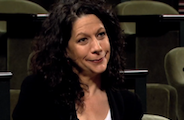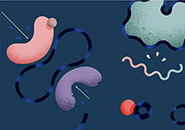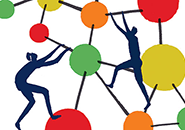
Scientific Discipline
Cancer Biology, Immunology
Host Institution
Boston Children's Hospital
Current Position
Dr. Alt is also director of the Program in Cellular and Molecular Medicine at Boston Children's Hospital, Charles A. Janeway Professor of Pediatrics at Boston Children's Hospital, and professor of genetics at Harvard Medical School.
Current Research
Antigen Receptor Diversity, Genomic Instability, and Cancer
Research
Biography
Our genes are under constant surveillance for damage to their DNA. Errors in gene replication, environmental insults, and chromosome breaks, all can spell trouble for our genome. While cells are often quick to recognize and repair DNA damage, these repair systems sometimes break down, leaving the genome unstable and increasing the risk of cancer.
For more than 30 years, Frederick Alt has studied how instability within the genome leads to cancer and has worked to uncover the cellular mechanisms that normally suppress this process. His discoveries have led to a greater understanding of the ways that cancer develops, and they hold promise for finding ways to control the disease.
For many scientists, interest in research is sparked by a teacher or hands-on experience, but Alt's attraction was borne from personal misfortune. "Both my mother and father died of cancer by the time I turned 11, and from that point on, I decided that I would spend the rest of my life working on this disease," Alt said.
As an undergraduate student at Brandeis University, he learned that elucidating basic cellular processes was one of the best ways to study cancer. That strategy paid off as a graduate student working in Robert Schimke's laboratory at Stanford in the 1970s. While investigating how cancers become resistant to the chemotherapy drug methotrexate, Alt discovered a major form of genomic instability called gene amplification, a fundamental process in cancer that creates many copies of a gene, in some cases numbering in the thousands. "While the initial discovery was made in the context of chemotherapy resistance, it soon became appreciated that gene amplification also is a major mechanism of tumor progression," Alt said.
In his own laboratory in the 1980s, Alt discovered the cancer-causing gene called N-myc. He also found that this gene is frequently amplified in neuroblastoma, a childhood brain cancer. Indeed, high levels of N-myc often are associated with aggressive disease, and N-myc gene amplification was subsequently found to be helpful in determining a patient's prognosis as well as measuring disease progression.
Alt had also turned his attention to immunology, investigating how the immune system genetically rearranges itself to recognize and attack virtually any type of foreign invader the body encounters. Coincidentally, this line of research also advanced his work in the field of genomic instability.
Working with David Baltimore, winner of the 1975 Nobel Prize in Physiology or Medicine, Alt focused on how key immune cells are generated. T cells recognize an infinite number of invaders via receptors on their surface and, in similar fashion, B cells can produce a limitless number of antibodies. The genes for these receptors and antibodies come in segments called Vs, Ds, and Js. Alt's research helped determine how these gene segments are cut and pasted together in endless combinations through a process called V(D)J recombination. He also showed that the same pathway involved in joining V, D, and J segments plays a key role in maintaining genomic stability by repairing broken DNA ends. Later, he identified several end-joining proteins in this pathway that help to maintain the stability of DNA and found that mice lacking these key proteins, along with loss of the p53 checkpoint protein, rapidly develop cancers of the immune system, as well as other tumors.
Today, Alt continues to focus his work where the fields of cancer and immunology intersect. "What intrigues me most about my work is learning how our cells harness the various mechanisms of genomic rearrangements to make a productive immune system while avoiding the potentially cancer-causing effects that can emerge when these processes go awry," he noted.
More recently, Alt's studies in mice revealed that the loss of H2AX, a chromosomal structural protein that helps to ensure that double-strand DNA breaks are repaired properly, coupled with the loss of the p53 protein, leads to the development of lymphomas and solid tumors. Notably, the genomic region containing H2AX is often altered in human cancer. He is also investigating a mechanism called class-switch recombination, used by the immune system to tell an antibody where to go in the body and what line of attack to use against an invader. Alt suspects that errors in this type of recombination may lead to chromosome swapping and the activation of cancer genes, events known to occur in many B cell lymphomas.
In addition to his research, Alt teaches immunology courses at Harvard Medical School, where he enjoys sharing his experiences and enthusiasm for research with his students. "The biggest reward from teaching is when a student actually ends up working in the field," Alt admits. "Within my lab, I try to provide a very rigorous scientific environment, where lab members are constantly challenged to think about and justify their work. At the same time, I try to promote a friendly and open environment where collaborative work and active discussion is encouraged."
Alt acknowledges that he is often consumed by his work, spending long hours in his laboratory. "Many people have asked how I can stand to spend endless days, nights, and weekends working. In reality, there is nothing that I enjoy more than being in the lab, and I feel quite fortunate to have been able to do something I enjoy so much as a career."
Articles & News
Research Papers
Selected Research Papers




